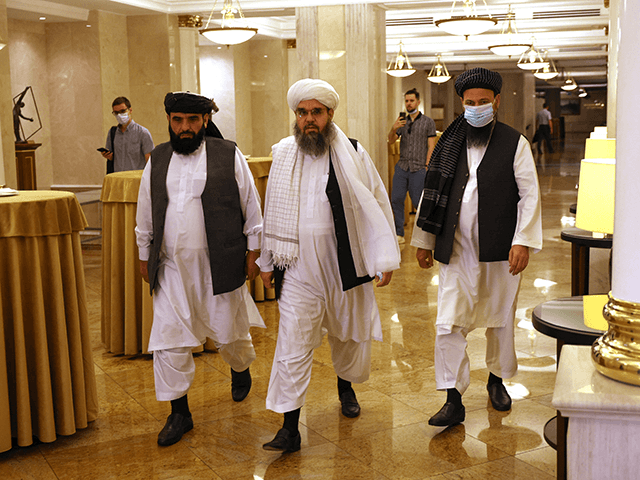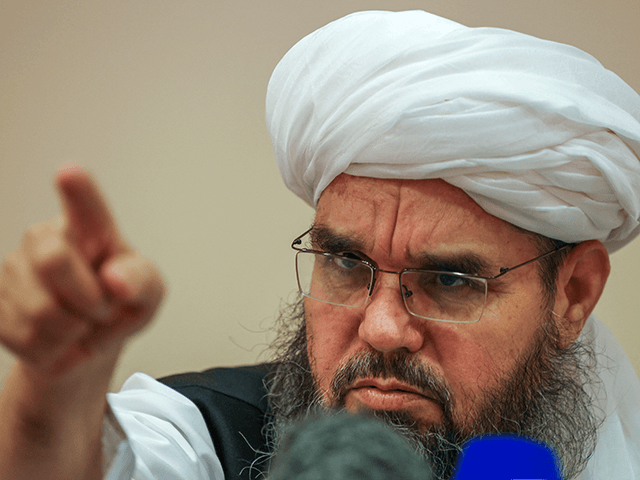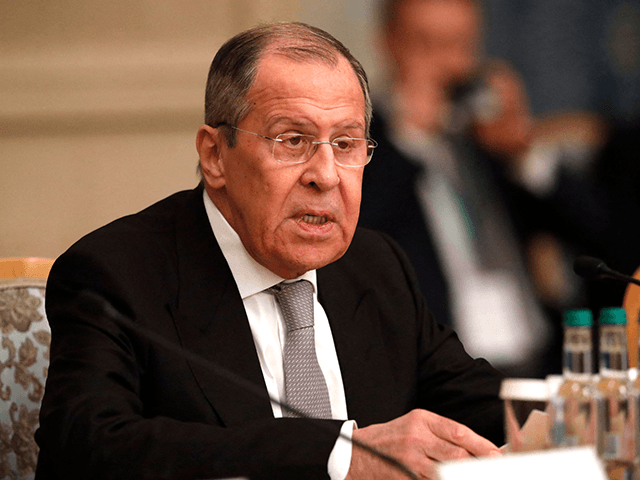Russian Foreign Minister Sergei Lavrov demanded “effective financial humanitarian support” from the international community for the brutal Taliban regime in remarks on Wednesday.
Russia hosted an international conference on Afghanistan that day that included the Taliban as an invited guest.
The conference in Moscow included Pakistan, China, Iran, India, and the former Soviet Union states in Central Asia, but not the United States. The Biden State Department on Monday applauded Russia’s “Troika-plus” meetings as an “effective” and “constructive forum,” but said it could not participate in this week’s Moscow summit because it was “logistically difficult” to attend.
The State Department did not explain why getting to Moscow is suddenly an insurmountable logistical challenge, having attended a similar conference held in Moscow in March.
Lavrov said on Wednesday he regretted the absence of the United States at the meeting.
“We are convinced that it is time to mobilize the resources of the international community to provide Kabul with effective financial humanitarian support, including to prevent a humanitarian crisis and reduce migration flows,” the Russian foreign minister declared.
Lavrov stressed that Moscow expects the Taliban to control Afghanistan’s borders and prevent terrorists from using Afghanistan as a base of operations for attacks in other countries.
“We call on the Taliban movement – and we discussed this with their distinguished delegation – to prevent the use of Afghanistan’s territory against third countries, most importantly neighbors,” he said.

Leaders of the Taliban movement and negotiators Abdul Latif Mansoor (R), Shahabuddin Delawar (C) and Suhail Shaheen (L) walk to attend a press conference in Moscow on July 9, 2021. (DIMITAR DILKOFF/AFP via Getty Images)
Just as China is primarily concerned with Uyghur Muslim militants establishing bases in Afghanistan to conduct operations in China, Russia is mainly concerned with ethnic Tajik militants crossing the border to make trouble in Russia’s ally Tajikistan. On Monday, Russia and Tajikistan launched their largest joint military drills since the Taliban takeover, maneuvering some 5,000 troops along the Afghan border.
The government of Tajikistan has been quite hostile toward the Taliban, which reciprocated with harsh language of its own. Pakistan and Russia are worried this hostility could ignite a border conflict, especially if Tajik militants do manage to operate across the border and threaten Tajikistan’s security.
Tajikistan is also currently hosting about 15,000 refugees from Afghanistan and fears a stampede across the border if the situation in Afghanistan continues to deteriorate.
Reuters reported Lavrov took a friendly and “conciliatory” tone toward the Taliban in his remarks, saluting their alleged efforts to “stabilize the military and political situation” and “set up state institutions.”
Lavrov said his government is satisfied with the Taliban’s efforts to ensure the safety of Russian citizens in Afghanistan. Unlike most other nations, Russia did not close its embassy in Kabul after the Taliban takeover, although it did “streamline” the staff and evacuate the family members of those who remained.
The Russian government still hesitates to formally recognize the Taliban regime, and still officially classifies the Taliban as a terrorist organization.
“What Russia wants to show is that it does have a solid working relationship with the new authorities in Afghanistan. It’s a way of flattering them, giving them legitimacy without recognizing them,” Samuel Ramani of the Royal United Services Institute in London told the Wall Street Journal on Wednesday.

Taliban negotiator Shahabuddin Delawar points as he attends a press conference in Moscow on July 9, 2021. (DIMITAR DILKOFF/AFP via Getty Images)
Another analyst, Andrey Kazantsev of the Moscow State Institute of International Relations, suggested the Taliban is essentially “on probation” with the Russian government, which is clearly laying out what it expects the new rulers of Afghanistan to do, and hinting at greater rewards for good behavior.
Humanitarian aid for Afghanistan remains a difficult subject for the U.S., European governments, and the United Nations.
The European Union (EU) last week announced a $1.15 billion aid package for Afghanistan, and for neighboring countries accepting large numbers of Afghan refugees. The EU acknowledged the Taliban has not lived up to the human rights commitments previously laid out as minimum standards for receiving international assistance but argued the humanitarian situation is so desperate that aid programs must be restored.
“The Afghan people should not pay the price of the Taliban’s actions,” European Commission president Ursula von der Leyen said last Tuesday.
The problem grudgingly acknowledged by humanitarian interests is that effective aid programs require more than just the Taliban granting access to rural Afghanistan and agreeing not to molest aid workers. As Lavrov hinted in his remarks on Wednesday, it seems necessary to restore Afghanistan’s financial system to some minimum level of working order after the devastation of the Taliban takeover, or else it will be impossible to deliver supplies or pay aid workers operating in the country.

COMMENTS
Please let us know if you're having issues with commenting.